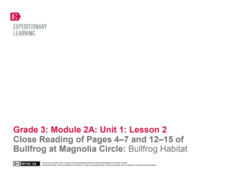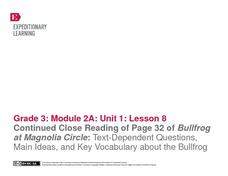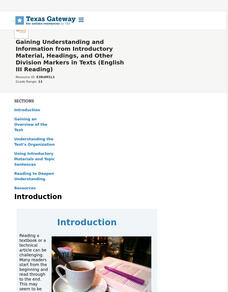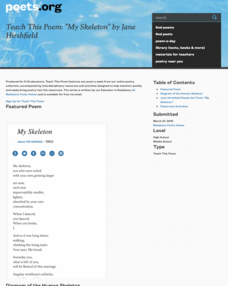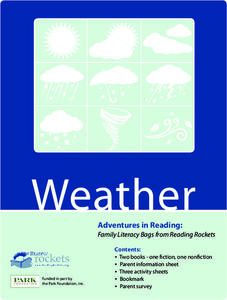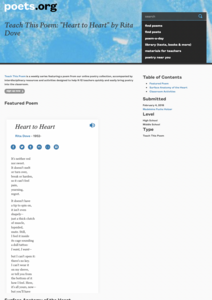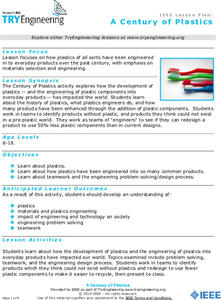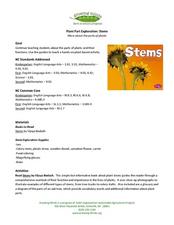EngageNY
Close Reading of Pages 4 - 7 and 12 - 15 of Bullfrog at Magnolia Circle: Bullfrog Circle
Scholars take part in a close reading of pages four through seven and 12-15 of the book, Bullfrog at Magnolia Circle: Bullfrog Circle by Deborah Dennard. Readers identify the story's main idea, list its key details, and examine...
Curated OER
Unit 1: Water is Life: The Heart and Science Behind this Phrase
Water, water, everywhere — but will there be enough to drink? Check out these detailed lesson plans to meet NGSS water cycle and CCSS literacy standards in your science classroom. Learners do a close reading of a challenging, poetic text...
EngageNY
Close Reading of Bullfrog at Magnolia Circle: Text-Dependent Questions, Main Ideas, and Key Vocabulary about the Bullfrog
As your 3rd grade class finishes reading Bullfrog at Magnolia Circle, the eighth lesson plan of this unit helps readers from an understanding of the very specific information on the final page of the book. As with the entire unit,...
Core Knowledge Foundation
Unit 9: The Science of Breakable Things by Tae Keller
A novel study examines The Science of Breakable Things by Tae Keller. Fifth graders participate in daily readings, discussions, and assignments following an "ask, explore, imagine, observe, and understand" routine. A final performance...
Core Knowledge Foundation
Insects Tell It Again!™ Read-Aloud Anthology
A read-aloud anthology explores the world of bees, wasps, beetles, termites, ants, fireflies, and more. Scholars listen to stories and discuss topics and practice word work. Extension opportunities keep the learning going in and out of...
Texas Education Agency (TEA)
Gaining Understanding and Information from Introductory Material, Headings, and Other Division Markers in Texts (English III Reading)
All teachers are teachers of reading! The 13-part interactive series ends with a lesson that teaches learners (and their instructors) how to approach reading their textbooks. After learning about several strategies, users test their...
Newspaper Association of America
Cereal Bowl Science and Other Investigations with the Newspaper
What do cereal, fog, and space shuttles have to do with newspapers? A collection of science investigations encourage critical thinking using connections to the various parts of the newspaper. Activities range from building origami seed...
Academy of American Poets
Teach This Poem: "In the Next Galaxy" by Ruth Stone
Imagine what life might be like in a different galaxy. That's the challenge young scientists take on in a warm-up activity designed to prepare them for a close reading of Ruth Stone's poem "In the Next Galaxy." After class members share...
College Board
The Departure
Scholars learn about the Hero's Journey as they read Ray Bradbury's "The Drummer Boy of Shiloh." They analyze the story's structure and narrative techniques. Finally, they write summaries of the text's central idea and use their...
Columbus City Schools
ABC: Acid Base Chemistry
Bubble, bubble, boil and trouble! What causes common substances like baking soda and vinegar to react the way they do? Welcome your junior chemists to the wonders of acid-base chemistry using a comprehensive and fun resource. Engage them...
Academy of American Poets
Teach This Poem: "My Skeleton" by Jane Hirshfield
Jane Hirshfield's poem "My Skeleton" asks readers to pause and think about the amazing, often taken-for-granted structure that protects and gives form to human bodies. After observing the human skeleton's image, class members read the...
PBS
Reading Adventure Pack: Weather
A reading adventure pack, featuring a fiction and nonfiction book focuses on the weather. Scholars read Cloudy with a Chance of Meatballs by Judi Barrett and Seymour Simon and then complete three creative activities. Participants craft...
Baylor College
What Makes Water Special?
Get close up and personal with a drop of water to discover how the polarity of its molecules affect its behavior. Elementary hydrologists split and combine water droplets, and also compare them to drops of oil. Much neater than placing a...
Consortium for Ocean Science Exploration and Engagement (COSEE)
Plankton to Penguins: Antarctic Food Web
A well-written lesson plan, second in a series of four, gets high schoolers exploring how the Antarctic food web is impacted by climate change and the associated melting of polar ice sheets. It begins with a PowerPoint presentation about...
Academy of American Poets
Teach This Poem: "Heart to Heart" by Rita Dove
Take heart! Here's a lesson that will encourage learners to notice details. After listening to Sarah Vaughan singing "My Funny Valentine" and noting how the word heart relates to Valentine's Day, scholars observe a human heart image....
Curriculum Corner
Hibernation
What is hibernation? Which animals hibernate and which don't? A 40-page packet on hibernation includes graphic organizers, reading passages and pictures about animals that hibernate, task cards, templates for a hibernation booklet,...
Baylor College
Water: Post-Assessment
Very simply, the science class will discuss what they have learned during The Science of Water unit and take a multiple-choice post-assessment quiz. A few other closing activities are suggested for you to choose from, such as having...
Carnegie Mellon University
Debate
Set your environmental studies class up to debate a current topic regarding your choice of six suggested statements about energy use in the United States. Teams read material that you have gathered and then form their arguments. The...
Institute of Electrical and Electronics Engineers
Blast Off!
With the use of a model rocket kit, aspiring aerospace engineers work cooperatively to construct and launch a rocket. A preparatory reading assignment is included, covering Newton's laws of motion and information about the first...
Brooklyn Children’s Museum
Volcanoes!
Give young geologists an up close and personal look at volcanoes with a series of hands-on earth science lessons. Whether they are investigating the properties of igneous rocks, building their own volcanoes, or making fudge to model the...
Curated OER
Reading Food Labels
Young nutritionists plan nutritional meals by using the USDA's Food Guide Pyramid. Before constructing their meal plans, they take a close look a food labels and learn how to decipher them. In today's world of obese and unfit children,...
Institute of Electrical and Electronics Engineers
A Century of Plastics
After reading about polymer materials, engineer trainees examine how plastics have been integrated into everyday products. In groups, they compile a list of products made entirely without plastics and then, as a closing activity, try to...
Curated OER
Fossil Fuels (Part I), The Geology of Oil
Junior geologists work through three mini-lessons that familiarize them with the formation and location of fossil fuels. Part one involves reading about petroleum and where it comes from via a thorough set of handouts. A lab activity...
Curated OER
Plant Part Exploration: Stems
Explore water transport in plant stems using this fun experiment! Your scientists will start by reading Stems by Vijaya Bodach. Then, activate prior knowledge about plant stem functions and water transportation. Demonstrate this concept...


